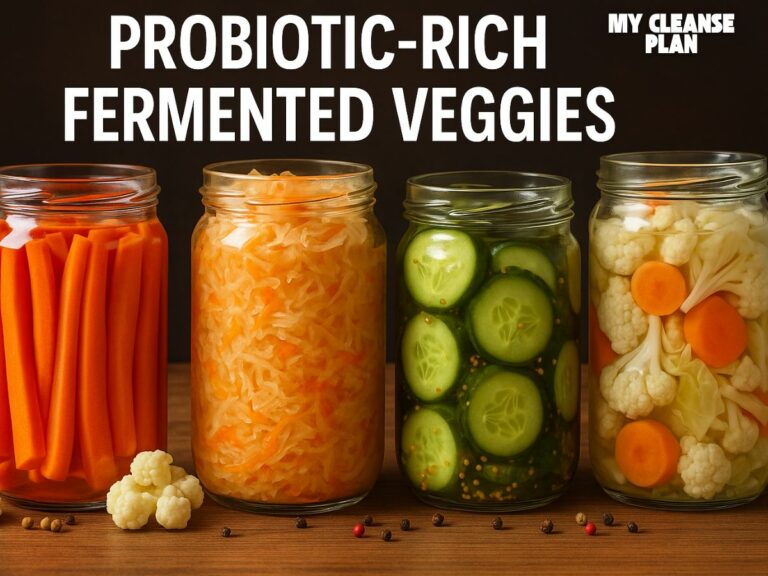How Urban Living Impacts Your Gut Microbiome
Ever felt a bit…off after a weekend in the city? Maybe a bloated feeling, or a general sense of not-quite-rightness in your tummy? You’re not alone!
City life can be tough on our bodies, and one surprising place it shows up is in our gut. This blog post will explore the link between how urban living impacts your gut microbiome, the trillions of tiny organisms that live in your digestive system.
You’ll learn how the fast-paced urban lifestyle can affect these crucial bacteria and how to keep your gut happy and healthy, gaining valuable insights to improve your well-being and create a better gut environment.
Key Takeaways
![How Urban Living Impacts Your Gut Microbiome[1]](https://mycleanseplan.com/wp-content/uploads/2025/10/How_Urban_Living_Impacts_Your_Gut_Microbiome1.jpg)
City Life and Your Gut: A Hidden Connection
Living in a bustling city presents unique challenges to our health. While urban areas offer convenience and opportunities, they can also create a less-than-ideal environment for our gut microbiome.
This section will explore the initial interactions between city life and your gut, setting the stage for a deeper understanding of the complexities involved.
We’ll examine how elements inherent in urban existence set off a chain reaction that affects our digestive system, sometimes in ways that we might not be aware of.
Nature Deficit Disorder and Gut Health
One of the most significant ways urban living impacts our gut is through reduced exposure to nature. Green spaces like parks and gardens are often scarce in cities, leading to a lack of exposure to beneficial bacteria found in soil and plants.
This can reduce the diversity of your gut microbiome, making it less resilient. The lack of outdoor time and contact with natural environments can lead to significant negative impacts on our health.
It’s about more than just scenic views; it’s about the microscopic ecosystems we interact with in natural settings.
- Reduced Exposure to Beneficial Bacteria: In natural environments, we encounter diverse microorganisms that help populate our gut. Cities often lack these exposures.
The absence of exposure to diverse soil bacteria and other environmental microbes is a major factor. These organisms interact with our immune system and help train it to distinguish between friend and foe. This process is essential to maintaining a healthy gut.
- Impact on Immune Function: Limited contact with nature can weaken our immune systems, leading to increased inflammation and susceptibility to illness.
Studies show that spending time in nature boosts our immune function. The lack of such exposure in urban settings results in a less active immune system, making it easier for harmful bacteria to take hold in the gut, contributing to gut imbalances.
- Increased Stress Levels: Urban environments tend to be more stressful, indirectly affecting the gut microbiome.
The constant stimulation of city life can elevate stress hormones, which can negatively impact the gut’s lining, potentially leading to an imbalanced microbiome.
The Urban Diet: A Recipe for Imbalance?
The typical urban diet often consists of convenience foods, processed meals, and limited access to fresh, whole foods.
This dietary pattern, rich in sugars and unhealthy fats and low in fiber, can severely harm the gut microbiome.
These dietary choices reduce the diversity of gut bacteria. Consequently, they promote the growth of harmful bacteria. Therefore, it contributes to gut inflammation and various health problems.
- Processed Foods and Sugar Overload: Cities are full of fast-food restaurants and readily available, processed snacks, which contribute to an unhealthy gut.
Processed foods are often low in fiber and high in added sugars and unhealthy fats, which can feed harmful bacteria in the gut, leading to inflammation and dysbiosis.
- Lack of Dietary Diversity: A limited range of foods in an urban diet results in a less diverse gut microbiome.
Consuming a limited variety of foods reduces the diversity of our gut bacteria, which is a key element of a healthy gut. Eating the same foods frequently deprives the gut of beneficial bacteria from different food sources.
- Limited Fiber Intake: Fiber is essential for feeding beneficial gut bacteria, and it is often deficient in an urban diet.
Fiber-rich foods like fruits, vegetables, and whole grains are often less accessible in cities or may be more expensive, leading to lower intake and promoting gut imbalance.
The Stress Factor: How Urban Living Affects Gut Microbiome
The pressure of city life introduces significant stressors. Chronic stress is linked to changes in the gut microbiome composition.
Stress hormones like cortisol can disrupt the gut’s balance. This creates a favorable environment for harmful bacteria to thrive.
The constant stress levels associated with living in a city can have cascading effects on our health. These effects explore the relationship between stress and the gut.
The Gut-Brain Axis: A Two-Way Street
The gut-brain axis is a complex communication network. It involves the brain and the gut, using nerves, hormones, and the gut microbiome to exchange information. Stress triggers changes in the gut, which then feed back to the brain.
This can affect mood, sleep, and even cognitive function. This bidirectional relationship explains why managing stress is so crucial for gut health.
- Impact of Cortisol: Chronic stress results in high cortisol levels, negatively affecting the gut’s lining and its function.
Elevated cortisol impairs the gut barrier, increasing gut permeability. This can lead to a condition known as leaky gut, which permits harmful substances into the bloodstream, thus, causing inflammation and other health issues.
- Changes in Gut Motility: Stress impacts how food moves through the digestive system, leading to issues like constipation or diarrhea.
Stress can slow down or speed up gut motility, leading to symptoms such as bloating, cramping, and irregular bowel movements. These issues will further disrupt the balance of the gut microbiome.
- Effects on Gut Permeability: Chronic stress can weaken the gut lining, increasing intestinal permeability and the risk of inflammation.
Chronic stress makes the gut lining more permeable. The protective layer of the gut is damaged, thus, allowing toxins and bacteria to leak into the bloodstream. That promotes a body-wide inflammatory response.
Specific Stressors in Urban Environments
Urban environments are full of stress triggers that may negatively impact your gut health. It’s crucial to pinpoint what specific stressors can affect your well-being and how to mitigate them. Identifying these stressors is the first step towards managing them effectively.
- Work-Related Pressure: Long hours and demanding jobs are common in cities, increasing stress levels.
The demands of urban work environments, including long commutes and high-pressure situations, can create chronic stress. This stress can significantly damage the gut microbiome, leading to negative health outcomes.
- Financial Concerns: The high cost of living in urban areas contributes to stress and its effects on gut health.
Financial pressures can keep stress levels high and disrupt gut function. This impacts the composition and function of the gut microbiome, affecting overall health.
- Social Pressures: The fast-paced social environment and expectations can also cause stress.
Urban social dynamics and high expectations contribute to stress, which, in turn, has a direct impact on your gut health. This disrupts the delicate balance of your gut microbiome.
Improving Gut Health in the City
Despite the challenges that urban living presents to the gut microbiome, there are numerous steps you can take to improve your gut health while living in a city. It’s possible to cultivate a healthy gut.
You must incorporate lifestyle changes that focus on diet, exercise, and stress reduction. Creating a healthy gut is possible by focusing on these lifestyle choices. The key is to be intentional about integrating these practices into your daily routine.
Dietary Strategies for a Healthy Gut
Your diet has a significant impact on gut health. Making specific changes in your eating habits can have a huge effect on the gut microbiome. Here are several dietary strategies to promote a healthier gut.
Adopting these changes makes your body more resilient to the challenges of urban living. Make a plan to include these strategies into your everyday lifestyle.
- Prioritize Fiber-Rich Foods: Fiber is essential for feeding beneficial gut bacteria.
Eat plenty of fruits, vegetables, whole grains, and legumes. Aim for a variety of colors to ensure you’re consuming a diverse range of nutrients.
- Incorporate Probiotic-Rich Foods: Probiotics introduce beneficial bacteria directly into your gut.
Add fermented foods like yogurt, kefir, sauerkraut, kimchi, and kombucha to your diet to increase the variety and number of beneficial bacteria. Read labels carefully for added sugars or preservatives.
- Limit Processed Foods and Added Sugars: Reducing intake of unhealthy foods can allow your gut to recover and thrive.
Cut back on fast food, sugary drinks, and highly processed snacks. Preparing your own meals from scratch whenever possible gives you complete control over your ingredients.
Exercise and Movement: A Gut-Friendly Approach
Regular exercise offers many benefits for overall health. It can improve the diversity and function of the gut microbiome. Staying active can reduce stress. Additionally, it can regulate gut motility. This creates a healthier gut environment.
- Benefits of Exercise for Gut Health: Exercise can increase the diversity and function of your gut bacteria.
Regular physical activity increases the diversity and abundance of beneficial bacteria, especially those that produce anti-inflammatory compounds. This helps maintain a healthy gut environment.
- Types of Exercise to Consider: Any form of exercise can be helpful, but some may be better than others.
Choose activities you enjoy, such as running, walking, cycling, or swimming. Yoga and Pilates can help reduce stress and improve gut health.
- Consistency is Key: Regular exercise is better than infrequent, intense workouts.
Aim for at least 30 minutes of moderate-intensity exercise most days of the week. Build it into your routine to make it a lasting habit.
Common Gut Health Problems in City Dwellers
The unique lifestyle of city dwellers often leads to several common gut health issues. Recognizing these problems and their root causes is key to addressing and dealing with them effectively.
Here are some of the most frequent problems affecting the gut health of people in cities and how to identify them.
Irritable Bowel Syndrome (IBS) and Urban Life
IBS is a common gastrointestinal disorder that can be worsened by stress and poor diet. It affects millions of people in urban environments. If you explore the links between IBS and urban living, you can better understand your gut health.
Understanding the link between IBS and city life helps you find ways to manage your health better. Symptoms of IBS include abdominal pain, cramping, bloating, diarrhea, and constipation.
- Stress and IBS: Stress can trigger and worsen IBS symptoms.
Managing stress is crucial for people with IBS. This includes techniques like mindfulness, meditation, and regular exercise. Also, creating a stress-free routine.
- Dietary Triggers: Certain foods, such as processed foods and high-FODMAP foods, can exacerbate IBS symptoms.
Identifying and avoiding trigger foods is an important part of managing IBS. A dietitian can help to create a personalized diet that suits your gut.
- Lifestyle Modifications: Regular exercise, adequate sleep, and stress management can help alleviate IBS symptoms.
Making lifestyle changes such as improving your sleep and stress will help with IBS symptoms. Creating an easy schedule that includes the proper food intake for your health.
Leaky Gut Syndrome: An Urban Concern
Also known as increased intestinal permeability, leaky gut allows harmful substances to enter the bloodstream. This can trigger inflammation and a range of health problems.
The effects of this condition can be amplified by the stress of urban life. Making informed choices can reduce the risks associated with leaky gut. Understanding its effects is the initial step.
- Causes of Leaky Gut: Stress, poor diet, and environmental factors contribute to this condition.
These factors can damage the gut lining and disrupt the gut barrier function. This increases intestinal permeability, leading to inflammation and other health problems.
- Symptoms: Symptoms include bloating, food sensitivities, fatigue, and skin problems.
Leaky gut has wide-ranging symptoms, that may be hard to diagnose. Always consult a healthcare professional.
- Management: Managing stress, improving your diet, and taking supplements may help heal leaky gut.
Reducing stress, eating anti-inflammatory foods, and using supplements like probiotics can help restore gut barrier function.
The Impact of Sleep on Gut Health
Sleep is essential for maintaining a healthy gut and overall well-being. The effects of sleep deprivation can result in gut health issues.
Prioritizing sleep is a crucial element of gut health. The gut microbiome is regulated by the sleep cycle. This link will improve your knowledge of how to get better sleep.
- Sleep and the Gut Microbiome: Poor sleep disrupts the balance of the gut microbiome.
The gut microbiome has its own circadian rhythm, which can be disrupted by a lack of sleep. This results in increased inflammation and reduced gut diversity.
- Sleep and Immune Function: Sleep deprivation impairs immune function, making you more susceptible to illness.
Sleep is a time for the body to repair itself, and it also supports immune function. Lack of sleep can make you more vulnerable to infections and gut dysbiosis.
- Improving Sleep Hygiene: Creating a sleep-friendly environment is vital.
Establish a regular sleep schedule, avoid caffeine and alcohol before bed, and create a relaxing bedtime routine to get better sleep.
FAQ Of How Urban Living Impacts Your Gut Microbiome
What is the gut microbiome?
A: The gut microbiome is a community of trillions of bacteria, fungi, viruses, and other microorganisms that live in your digestive system. It plays a vital role in digestion, immune function, and overall health.
How does stress affect gut health?
A: Stress can disrupt the balance of the gut microbiome, increase gut permeability, and slow down gut motility. This can contribute to inflammation and various digestive issues.
What are some good foods for gut health?
A: Fiber-rich foods like fruits, vegetables, and whole grains, as well as probiotic-rich foods like yogurt, kefir, sauerkraut, kimchi, and kombucha, are great for gut health.
How can I reduce stress in an urban environment?
A: Practice mindfulness, meditation, and deep breathing exercises. Incorporate regular exercise into your routine and make time for relaxing activities like spending time in nature or pursuing hobbies.
Can I improve my gut health living in a city?
A: Yes! By making dietary changes, incorporating regular exercise, managing stress, and prioritizing sleep, you can significantly improve your gut health, even while living in an urban environment.
Final Thoughts
The gut microbiome is heavily influenced by our urban lifestyle. The scarcity of nature, the overabundance of processed foods, and the ever-present stress of city living all take a toll on our gut health. However, it’s not a hopeless situation.
By consciously making changes to your diet, exercise routine, and stress management techniques, you can positively affect your gut health, no matter where you live.
Focus on incorporating more fiber-rich foods, incorporating regular exercise, and building stress-reducing activities to improve your gut health. With some dedication, it’s possible to create a thriving gut microbiome and enjoy a healthier, more balanced life.



![Gut Health Tips for the Holiday Season Stress, Overeating, Travel[1]](https://mycleanseplan.com/wp-content/uploads/2025/11/Gut_Health_Tips_for_the_Holiday_Season__Stress_Overeating_Travel1-768x448.jpg)
![Microbial Signature Index Unveiling Disease Prediction Capabilities[1]](https://mycleanseplan.com/wp-content/uploads/2025/10/Microbial_Signature_Index__Unveiling_Disease_Prediction_Capabilities1-768x448.jpg)
![Gut Health During Pregnancy and Baby's Early Microbiome Development[1]](https://mycleanseplan.com/wp-content/uploads/2025/10/Gut_Health_During_Pregnancy_and_Babys_Early_Microbiome_Development1-1-768x448.jpg)
